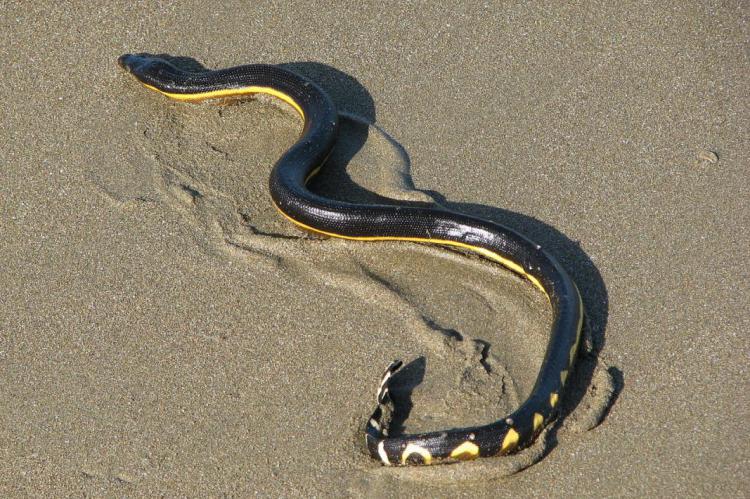Scientists discover sea snake can dehydrate for months
Yellow-bellied sea snake can reconstitute itself after heavy rains
According to a new study, the yellow-bellied sea snake (Hydrophis platurus) can dehydrate for several months before reconstituting itself after heavy rains. “Survival depends on a high tolerance to dehydration, slow rates of water loss in seawater, a capacity to eliminate some amount of excess salts because of salt glands these animals possess in addition to the kidney, and the skin is not permeable to sodium, so no update occurs via this route,” stated lead author Harvey Lillywhite, a biology professor at the University of Florida.
Lillywhite and his team studied a population of yellow-bellied sea snakes inhabiting the Gulf of Papagayo, located off of northwestern Guancaste, Costa Rica. Although the snakes drink freshwater, they ingest a lot of salt from swallowing their fish prey. Scientists determined the snakes could tolerate an incredible amount of dehydration, remaining in this state for six to seven months at a time. However, following seasonal periods of heavy rainfall, they promptly plump up with water.
Although the snakes spend most of their time in the water column, they must periodically surface to breathe. It is also suspected they come to the surface after heavy rains to drink the freshwater that briefly accumulates at the ocean’s surface. “The snake simply gulps water and then closes the mouth while water is forced into the stomach,” explained Lillywhite.
Seasonal changes are a matter of life or death for the snakes, with some species experiencing population declines or even becoming extinct due to periods of prolonged drought. Climate change models suggest areas of drought in the tropics could expand or intensify in the future.” We cannot do anything about this except to enact measures to combat climatic changes attributable to human enhancement (such as when we burn fossil fuels),” said Lillywhite. “We could take measures to protect coastal areas where sea snakes are presently abundant because of locally heavy rainfall,” he added.


